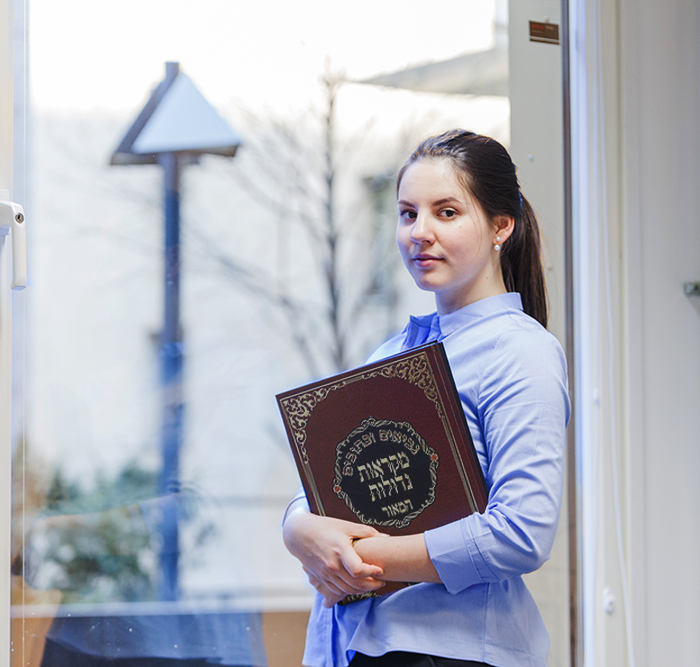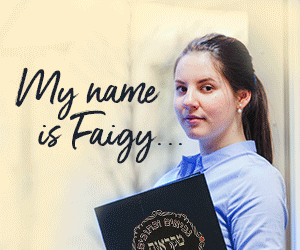
My name is Faigy and I’m an addict. While I may not look it, I grew up in a frum community. My story is not all-inclusive of formerly observant Jewish addicts, but many share a similar story.
What you know about me:
My family seemed like a normal frum family. You might remember me as a troublemaker in my childhood. I disrupted the classroom, maybe a little more than most kids. Everyone thought I had ADHD.
My behaviors continued to get worse which landed me in different schools. I started hanging out with the “wrong” crowd, doing what they did: smoking, partying, wasting time – labeled “at risk”. Of course this hurt my parents. And what about my siblings? What kind of influence was I having on them? What kind of influence was I having on other kids in the community?
I went away to an out-of-town school for a while. That’s the last you heard of me until I returned to the community. I’ve had a few jobs at local stores. You heard I was using drugs. How could this happen? You wonder if something happened in my home. You wonder why I can’t stop. You wonder why I can’t turn my life around. Nebach….
What you don’t know about me:
I was a curious child, full of life. I saw the world as my playground. I trusted, and I was sensitive. Yes, I carried a lot of energy with me into the classroom.
At some point, my personality shifted. I became an angry child. Later in my life I would discover the sinister reason for this change. My parents didn’t know what to do with me. They put me in therapy – it didn’t help. I started asking a lot of big questions about life and G-d, but wasn’t getting answers. “We don’t ask those questions”…”Your job is to be a good Jew”, I was told.
I felt alone and misunderstood. I felt rejected so I started hanging out with rejects. I started smoking, and alcohol was readily available in our home. My behaviors were seen as rebellious. My friends were no longer allowed to come to my house. It was like I had tzara’as – excommunicated. In reality I felt a deep pain – a pain that continued to pull me down into a dark abyss where I was surrounded by chaos and confusion.
I was sent to schools for “rejects”. Coming from the little bubble of my community I was naive. My world quickly expanded as fellow students taught me about drugs and how to have “fun”. I don’t know if it was the curiosity, or the constant pain in my heart that kept me thirsty to learn more and to do more.
Drugs became my entire life. Everyday was about getting anything and everything into my system. Some of us play as pharmacists – learning how to mix and match drugs. Most of us take whatever we can get our hands on. You ask how dangerous this is, but you should first be asking how much I care. If you could only feel the pain I feel, you would do anything to numb it. Think about the places I go to get my fix. Think about how I get drugs when I have no money. Imagine you are in a brightly lit room, but you are completely dark on the inside. This is how I feel day after day.
On the very rare occasion that the sun peeks through the clouds, I get a glimpse of hope. Denial usually refers to denying one has a drug problem. There is also denial that something can help us – that there is a program that actually works. That somehow we can have a better life – a life of freedom, whatever that means. I don’t know what a better life looks like, and most times I don’t care. At least that’s what I tell myself and everyone around me. Still, if you care, if you really care then you will not give up on me. You need to keep believing in me until I start believing in myself, and I might start trying to have that better life. Even if I fail a thousand times don’t give up on me. Please…
This letter represents thousands of individuals raised in our communities who are currently struggling with addiction. It may be a parent, sibling, or child. It may be a friend. It may be a server at a local restaurant. Drug abuse is increasing in our communities and certain drugs are becoming exceedingly fatal, ending in too many overdoses – even one overdose is too much.
Beit Nesicha is opening its doors this fall in Israel to provide residential treatment, followed by transitional living, for English-speaking Jewish women ages 17 and older, who want to live a life free of drugs and alcohol. Our treatment model includes evidence-based interventions: 12-step, SMART Recovery, ACT, Somatic Experiencing, animal-assisted therapies, and art therapy. There is a strong focus on healing mind and body through fitness, meditation, and recreational activities, along with achieving individual life goals: educational (GED, college prep) and vocational training. Jewish practice is not enforced, but respected within the community. Our program offers a kosher-mehadrin kitchen, and Shabbat/Chag is honored with song, comfort, love, and connection.
Thankfully we have raised funds for several startup costs (e.g., appliances, furnishings). We are currently fundraising for a transport vehicle, and scholarships for families who do not have the funds for treatment. Our cost for 120 days of residential treatment is $20,000, and the cost of 120 days in our transitional living program is $10,000. While these costs are substantially lower than other treatment facilities, families are often drained of finances put into past therapies and treatment. Please help us exceed our fundraising goal and open our program for every Jewish princess seeking to nurture her royal spark into a shining beacon of serenity, dignity, and courage.
For More Information Please Click Here












One Response
I am happy to see that addiction/mental health issues are being more openly discussed. For too long addiction especially among frum jews has been completely swept under the rug. We as a community have stigmatized it for too long. There are so many of us who have suffered/are suffering from addiction (whatever the drug may be) and it shouldn’t be shameful to get help.